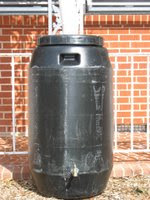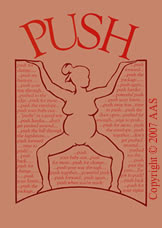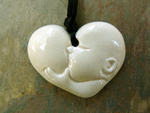Interesting bit of research I came upon today. A Scandinavian study shows an "association between being foreign-born and non-normal childbirth. Questions can be raised whether we are aware of, pay sufficient attention to, and allocate sufficient resources for these women at higher risk of non-normal birth in maternity care."
This does raise questions for me, but it answers a big one. It confirms - for me - that women culturally learn what is "normal" over time and accept it. In the US, after a hundred plus years of medical intervention -- control and disempowerment and belief that women's bodies can not give birth without interventions, and that is what we have. It is accepted as "normal" and even unthinkable to have a baby at home and without drugs. The political and legal climate has lead to 99% of all births being in the hospital and has CREATED the "norming" of hospital as the safest even when the research shows it is not. Decades of women and birthing babies being uninformed, non-consenting research subjects (I haven't said that for weeks!!) have lead to accepting the fear of birth and pain, and the invasive care and treatment as normal. We are like that frog who has been sitting in water that is gradually coming to a boil and we don't even know it. Take a frog and throw it in boiling water and it will jump out. Take a birthing woman from Sweden and throw her in Missouri or Illinois or South Dakota and I betcha she jumps high and far.
Here, from the country with the best maternal and neonatal rates, Sweden, we have evidence of the power of the mind and conditioning. We're being brainwashed in the US by the medical system -- in the name of science. Take the average woman from anywhere in the US where women have been taught to fear birth and that drugs don't harm her baby, and the birth is all about her needs anyway --- how WOULD she do giving birth in Sweden? "Giiiiiiiive meee myyyyyy epidural!!" and "I insist on scheduling a cesarean. My pelvis is too small -- my doctor in the US said so" (Culturally, this feeds into the body-image issue and women's need to be small in the US.) How would demanding her rights to her epidural and planned cesarean go over in Sweden? And, how would the average American woman fare giving birth "normally" in Sweden? Not well, I imagine.
Veeeeeerrry interesting. GREAT piece of research.
Acta Obstetricia et Gynecologica Scandinavica
Volume 84 Issue 9 Page 825 - September 2005
Do foreign-born women in Sweden have an increased risk of non-normal childbirth?
Eva Robertson, Marianne Malmström, Sven-Erik Johansson (2005)
1From the Center for Family Medicine Stockholm, Karolinska Institute, Alfred Nobels allé, Huddinge, Sweden
*Eva Robertson Center for Family Medicine Stockholm, Karolinska Institute, Alfred Nobels allé 12, SE-141 83 Huddinge Sweden
Abstract
Background. In this cross-sectional study, we analyze whether foreign-born women in Sweden had more non-normal childbirths than Swedish-born women during 1996–1998, adjusting for age, parity, level of education, number of antenatal care visits, and complications in pregnancy.
Methods.
The study includes 215 497 singleton deliveries (including the first childbirth of each woman during the time period) of women aged 18–47 in Sweden during 1996–1998, divided into 12 subgroups of countries. The risk of non-normal birth was analyzed by means of logistic regression.
Results.
Women from Sub-Saharan Africa, Iran, Asia, and Latin America had a higher age-adjusted risk of non-normal childbirth than Swedish-born women that remained and even increased for the African and Latin American women in the main effect model. Interactions between country of birth and antenatal care visits showed that women from Sub-Saharan Africa, Iran, Asia, and Latin America had almost 50% higher risk of non-normal birth with ≥13 antenatal care visits than Swedish-born women. Interactions between country of birth and complications in pregnancy showed that women from Turkey, Iran, Asia, and Latin America had over 50% higher risk of non-normal birth than the Swedish-born women.
Conclusions.
This study shows an association between being foreign-born and non-normal childbirth. Questions can be raised whether we are aware of, pay sufficient attention to, and allocate sufficient resources for these women at higher risk of non-normal birth in maternity care.
The Other Side of the Glass
Part One was officially released June 2013 in digital distribution format.
To purchase to to www.theothersideoftheglass.com
If you were a donor and want to download your copy send an email to theothersideoftheglassfilm@gmail.com.
The trailer
Wednesday, February 07, 2007
Subscribe to:
Post Comments (Atom)
"Soft is the heart of a child. Do not harden it."
A public awareness reminder that things that happen behind the scenes, out of our sight, aren't always as rosy as we might think them to be. Perhaps its a restaurant cook who accidentally drops your burger
on the floor before placing it on the bun and serving it to you. Here it's an overworked apathetic (pathetic) nurse giving my newborn daughter her first bath.
Please comment and rate this video, so as to insure that it is viewed as widely as possible, perhaps to prevent other such abuse. -- The mother who posted this YouTube. How NOT to wash a baby on YouTube
Are you going to try to tell me that "babies don't remember?" There is no difference to this baby's experience and the imprinting of her nervous system/brain and one that is held and cleaned by the mother or father either at the hospital or at home?
By the way, this is probably NOT the baby's first bath. The nurse is ungloved. Medical staff protocol is that they can't handle a baby ungloved until is has been bathed (scrubbed if you've seen it) because the baby is a BIO-HAZARD -- for them. Never mind that the bio-hazard IS the baby's first line of defense against hospital germs.
Missouri Senator Louden Speaks
Finally, A Birth Film for Fathers
Part One of the "The Other Side of the Glass: Finally, A Birth Film for and about Men" was released June, 2013.
Through presentation of the current research and stories of fathers, the routine use of interventions are questioned. How we protect and support the physiological need of the human newborn attachment sequence is the foundation for creating safe birth wherever birth happens.
Based on knowing that babies are sentient beings and the experience of birth is remembered in the body, mind, and soul, fathers are asked to research for themselves what is best for their partner and baby and to prepare to protect their baby.
The film is designed for midwives, doulas, and couples, particularly fathers to work with their caregivers. Doctors and nurses in the medical environment are asked to "be kind" to the laboring, birthing baby, and newborn. They are called to be accountable for doing what science has been so clear about for decades. The mother-baby relationship is core for life. Doctors and nurses and hospital caregivers and administrators are asked to create protocols that protect the mother-baby relationship.
Men are asked to join together to address the vagaries of the medical system that harm their partner, baby and self in the process of the most defining moments of their lives. Men are asked to begin to challenge the system BEFORE they even conceive babies as there is no way to be assured of being able to protect his loved ones once they are in the medical machine, the war zone, on the conveyor belt -- some of the ways that men describe their journey into fatherhood in the medicine culture.
Donors can email theothersideoftheglassfilm@gmail.com to get a digital copy.
Through presentation of the current research and stories of fathers, the routine use of interventions are questioned. How we protect and support the physiological need of the human newborn attachment sequence is the foundation for creating safe birth wherever birth happens.
Based on knowing that babies are sentient beings and the experience of birth is remembered in the body, mind, and soul, fathers are asked to research for themselves what is best for their partner and baby and to prepare to protect their baby.
The film is designed for midwives, doulas, and couples, particularly fathers to work with their caregivers. Doctors and nurses in the medical environment are asked to "be kind" to the laboring, birthing baby, and newborn. They are called to be accountable for doing what science has been so clear about for decades. The mother-baby relationship is core for life. Doctors and nurses and hospital caregivers and administrators are asked to create protocols that protect the mother-baby relationship.
Men are asked to join together to address the vagaries of the medical system that harm their partner, baby and self in the process of the most defining moments of their lives. Men are asked to begin to challenge the system BEFORE they even conceive babies as there is no way to be assured of being able to protect his loved ones once they are in the medical machine, the war zone, on the conveyor belt -- some of the ways that men describe their journey into fatherhood in the medicine culture.
Donors can email theothersideoftheglassfilm@gmail.com to get a digital copy.
Buy the film at www.theothersideoftheglass.com.
The film focuses on the male baby, his journey from the womb to the world and reveals healing and integrating the mother, father, and baby's wounded birth experience. The film is about the restoring of our families, society, and world through birthing loved, protected, and nurtured males (and females, of course). It's about empowering males to support the females to birth humanity safely, lovingly, and consciously.
Finally, a birth film for fathers.
The film focuses on the male baby, his journey from the womb to the world and reveals healing and integrating the mother, father, and baby's wounded birth experience. The film is about the restoring of our families, society, and world through birthing loved, protected, and nurtured males (and females, of course). It's about empowering males to support the females to birth humanity safely, lovingly, and consciously.
Finally, a birth film for fathers.
What People Are Saying About the FIlm
Well, I finally had a chance to check out the trailer and .. wow! It's nice that they're acknowledging the father has more than just cursory rights (of course mom's rights are rarely acknowledged either) and it's great that they're bringing out the impact of the experience on the newborn, but I'm really impressed that they're not shying away from the political side.
They are rightly calling what happens in every American maternity unit, every day, by its rightful name - abuse. Abuse of the newborn, abuse of the parents and their rights, abuse of the supposedly sacrosanct ethical principal of patient autonomy and the medico-legal doctrine of informed consent, which has been long ago discarded in all but name. I love it!
In the immortal words of the "shrub", "bring it on!" This film needs to be shown and if I can help facilitate or promote it, let me know.
Father in Asheville, NC
Thanks for sharing this. It was very touching to me. I thought of my brother-in-law standing on the other side of the glass when my sister had to have a C-section with her first child because the doctor was missing his golf date. I'll never forget his pacing back and forth and my realizing that he was already a father, even though he hadn't been allowed to be with his son yet.
Margaret, Columbia, MO
They are rightly calling what happens in every American maternity unit, every day, by its rightful name - abuse. Abuse of the newborn, abuse of the parents and their rights, abuse of the supposedly sacrosanct ethical principal of patient autonomy and the medico-legal doctrine of informed consent, which has been long ago discarded in all but name. I love it!
In the immortal words of the "shrub", "bring it on!" This film needs to be shown and if I can help facilitate or promote it, let me know.
Father in Asheville, NC
OMG'ess, I just saw the trailer and am in tears. This is so needed. I watch over and over and over as fathers get swallowed in the fear of hospitals birth practice. I need a tool like this to help fathers see how very vital it is for them to protect their partner and baby. I am torn apart every time I see a father stand back and chew his knuckle while his wife is essentially assaulted or his baby is left to lie there screaming.
Please send me more info!!!!
Carrie Hankins
CD(DONA), CCCE, Aspiring Midwife
720-936-3609
Thanks for sharing this. It was very touching to me. I thought of my brother-in-law standing on the other side of the glass when my sister had to have a C-section with her first child because the doctor was missing his golf date. I'll never forget his pacing back and forth and my realizing that he was already a father, even though he hadn't been allowed to be with his son yet.
Margaret, Columbia, MO
In case you don't find me here
Soon, I'll be back to heavy-duty editing and it will be quiet here again. I keep thinking this blog is winding down, and then it revives. It is so important to me.
I wish I'd kept a blog of my journey with this film this past 10 months. It's been amazing.
I have a new blog address for the film, and will keep a journal of simple reporting of the journey for the rest of the film.
www.theothersideoftheglassthefilm.blogspot.com
I'll be heading east this week to meet with a group of men. I plan to post pictures and clips on the film blog.
I'll keep up here when I can -- when I learn something juicy, outrageous, or inspiring related to making birth safer for the birthing baby.
I wish I'd kept a blog of my journey with this film this past 10 months. It's been amazing.
I have a new blog address for the film, and will keep a journal of simple reporting of the journey for the rest of the film.
www.theothersideoftheglassthefilm.blogspot.com
I'll be heading east this week to meet with a group of men. I plan to post pictures and clips on the film blog.
I'll keep up here when I can -- when I learn something juicy, outrageous, or inspiring related to making birth safer for the birthing baby.
Review of the film
Most of us were born surrounded by people who had no clue about how aware and feeling we were. This trailer triggers a lot of emotions for people if they have not considered the baby's needs and were not considered as a baby. Most of us born in the US were not. The final film will include detailed and profound information about the science-based, cutting-edge therapies for healing birth trauma.
The full film will have the interviews of a wider spectrum of professionals and fathers, and will include a third birth, at home, where the caregivers do a necessary intervention, suctioning, while being conscious of the baby.
The final version will feature OBs, RNs, CNMs, LM, CPM, Doulas, childbirth educators, pre and perinatal psychologists and trauma healing therapists, physiologists, neurologists, speech therapists and lots and lots of fathers -- will hopefully be done in early 2009.
The final version will include the science needed to advocated for delayed cord clamping, and the science that shows when a baby needs to be suctioned and addresses other interventions. Experts in conscious parenting will teach how to be present with a sentient newborn in a conscious, gentle way -- especially when administering life-saving techniques.
The goal is to keep the baby in the mother's arms so that the baby gets all of his or her placental blood and to avoid unnecessary, violating, and abusive touch and interactions. When we do that, whether at home or hospital, with doctor or midwife, the birth is safe for the father. The "trick" for birthing men and women is how to make it happen in the hospital.
The full film will have the interviews of a wider spectrum of professionals and fathers, and will include a third birth, at home, where the caregivers do a necessary intervention, suctioning, while being conscious of the baby.
The final version will feature OBs, RNs, CNMs, LM, CPM, Doulas, childbirth educators, pre and perinatal psychologists and trauma healing therapists, physiologists, neurologists, speech therapists and lots and lots of fathers -- will hopefully be done in early 2009.
The final version will include the science needed to advocated for delayed cord clamping, and the science that shows when a baby needs to be suctioned and addresses other interventions. Experts in conscious parenting will teach how to be present with a sentient newborn in a conscious, gentle way -- especially when administering life-saving techniques.
The goal is to keep the baby in the mother's arms so that the baby gets all of his or her placental blood and to avoid unnecessary, violating, and abusive touch and interactions. When we do that, whether at home or hospital, with doctor or midwife, the birth is safe for the father. The "trick" for birthing men and women is how to make it happen in the hospital.








No comments:
Post a Comment